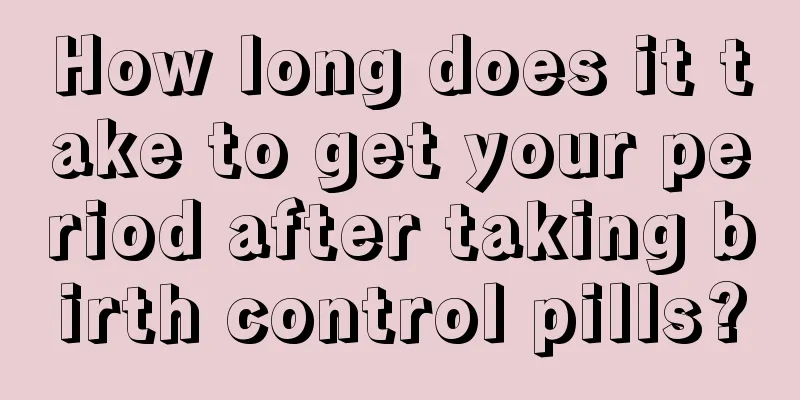How long does it take to get your period after taking birth control pills?

|
Everyone knows that contraceptive pills are very effective, so women's menstruation will definitely be affected after taking contraceptive pills, because contraceptive pills are mainly used to interfere with the secretion of female hormones. When the endocrine system in women's bodies is disturbed, women's menstruation will be affected to a certain extent, so women may experience delayed menstruation. So how long will it take for menstruation to come after taking contraceptive pills? Taking emergency contraceptive pills will definitely affect menstruation, because the ingredients and contents of emergency contraceptive pills are different from those of short-acting contraceptive pills. Emergency contraceptive pills, such as the most common Yuting, are high-content, high-titer estrogen and progesterone pills, which have a huge impact on women's menstrual cycle. It is generally recommended that women choose safer methods with fewer side effects for contraception, such as tool contraception or ring contraception. Only take emergency contraceptive pills as a last resort. The number of times you take emergency contraceptive pills within one year must not exceed three times. If you take emergency contraceptive pills too many times, it will have very serious side effects on women's ovarian function and cardiovascular function. In severe cases, it will cause premature ovarian failure, and even more serious cases will cause cerebral infarction and a series of serious complications. The time of menstruation will be different depending on the period of your menstrual cycle. If you take birth control pills before ovulation, your menstrual cycle will be delayed by about 7-10 days. If you take birth control pills after ovulation, your menstruation will come about 7-10 days earlier. How long does it take to get your period after taking birth control pills? 1. People who usually take short-term contraceptive pills If you are taking short-acting contraceptives on a regular basis, it will be much easier to delay your period. They only need to continue taking the short-acting contraceptive pills they usually take, and choose to stop taking them after the holidays. Menstruation will come 3-5 days after stopping the pills. 2. Taking birth control pills Women with regular menstrual cycles can start taking two short-acting contraceptive pills a day 5 days before the next menstrual period and continue taking them until they feel their period is coming. Side effects of birth control pills 1. Loss of appetite, nausea, vomiting, dizziness, and weakness. This often happens when you start taking a medication. When this reaction occurs, on the one hand, you can drink some strong tea, chew some candied ginger, and pickles; on the other hand, you must insist on taking the medication as prescribed. As the body adapts to the medication, the reaction will gradually disappear. For some women who have more severe reactions, they can take the following reaction-suppressing drugs appropriately: vitamin B6, 20 mg each time, 3 times a day; vitamin C, 100 mg per second, 3 times a day; anti-reaction tablets, 1 tablet each time, 3 times a day; compound aluminum hydroxide tablets or yeast tablets, 1 gram each time, once a day, taken together with contraceptives. 2. Leucorrhea increases and becomes thinner. It often occurs after taking long-acting contraceptives. Generally, no treatment is required. If there is too much leucorrhea, you can put a Chinese medicine tablet in the vagina every night. 3. Intermittent vaginal bleeding. It often occurs after missing a dose of birth control pills. Generally, as long as you continue to take the pills on time, the bleeding will stop and your menstrual period will return to normal. Of course, you can also ask your doctor to adjust the medication, or you can change to other contraceptives. For example, if you bleed after taking No. 2 contraceptive, you can switch to No. 1 contraceptive. 4. Lack of menstruation or even amenorrhea. This condition does not have much impact on physical health and is often temporary. If you have amenorrhea for three consecutive months, you should stop taking the medication, take other contraceptive measures, and resume taking the medication after menstruation resumes on its own. If menstruation still does not occur within one month after stopping the medication, you should ask your doctor to use drugs such as medroxyprogesterone acetate, combined progesterone or menstrual induction tablets to induce menstruation based on the examination results. After that, you should switch to other contraceptives. 5. Gaining weight too quickly. If you experience edema while taking birth control pills, use diuretics and low-salt foods; if your weight continues to increase significantly, you should stop taking the pills and use other contraceptive methods. 6. Yellow-brown spots appear on the face. It will generally disappear gradually after stopping the medication. If you take vitamin B or vitamin C, the effect will be better. 7. Breast pain. If breast tenderness occurs, it is recommended to reduce the dosage. If it is severe, you should consider stopping the medication and choosing other contraceptive measures. |
<<: I took the contraceptive pill and I have some abdominal pain
>>: What to do if there are too many blood clots during menstruation
Recommend
Can nighttime urine test for pregnancy?
Many people choose to use the first urine in the ...
Will wearing glasses for a long time cause my eyesight to worsen?
When Zhang Zifeng participated in a variety show,...
How to exercise your chest?
Breasts are one of the features that distinguish ...
What are some foods that can promote blood circulation and remove blood stasis during menstruation?
Menstruation is a love-hate relationship for wome...
Treatment for sleep discomfort in late pregnancy
We all know that each of us comes into this world...
Is the fetus formed at 55 days of pregnancy? What does the fetus look like at 55 days of pregnancy?
We all know that after a woman becomes pregnant, ...
How to calculate the pregnancy period
When women learn that they are pregnant, the burd...
The location of a woman's stomach
The stomach is particularly important to the huma...
Rehabilitation of cognitive dysfunction after stroke
Post-stroke cognitive impairment refers to a seri...
How long does it take for a sharp female to be cured?
Genital warts are a common clinical disease. This...
Can I take a chest X-ray while breastfeeding?
Many mothers who have just given birth also have ...
What's going on if there is a little blood in the leucorrhea?
Normal leucorrhea is milky white or colorless and...
What causes uterine cysts in life?
In our current life, many times, we inevitably ig...
What are the dietary treatments for kidney yang deficiency in women?
During seasonally sensitive periods, women's ...
What are the symptoms of menopausal irregular menstruation?
Irregular menstruation is a problem that many wom...









